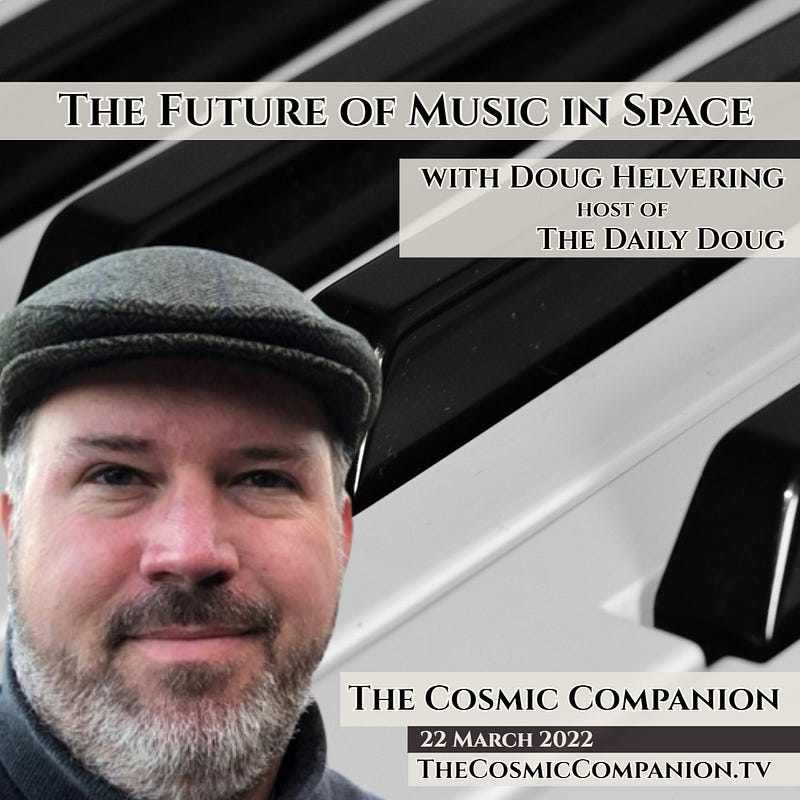Exploring the Future of Music Beyond Earth: A Cosmic Journey
Written on
The Evolution of Music and Space Migration
As humanity looks to the stars and considers life beyond our planet, one intriguing question arises: what will the future of music be in space? In this discussion with Doug Helvering, the host of The Daily Doug, we will explore this fascinating topic.

Historically, music has reflected societal changes, evolving from the simple rhythms of our ancestors to the diverse expressions found on platforms like YouTube today. This evolution often mirrors the migration of peoples and their collaborative efforts. The interplay of economic shifts and technological advancements continues to redefine musical possibilities.
In this exploration, we’ll identify three key factors that have historically influenced musical expression and consider how humanity's expansion into space will shape the art of music in the future.
Collaboration Through Migration
Music plays a crucial role in shaping identities, both on a global and local scale. When diverse communities intersect, musicians often collaborate, leading to the birth of new genres that diverge from their origins.
During the 16th and 17th centuries, European settlers brought their folk traditions to the Americas, preserving these sounds even as they faded back home. The African diaspora profoundly influenced American music by introducing unique instruments and styles, including call-and-response patterns that are now foundational in modern music.
In the early 20th century, the isolation of Appalachian communities fostered a distinctive folk sound. As these residents moved to urban areas in the 1920s, their interactions with gospel and blues musicians laid the groundwork for country music, a legacy exemplified by artists like Dolly Parton.
As we contemplate future musicians aboard space habitats, they will likely experience a similar dynamic of isolation and change, sparking new collaborations and musical inspirations among a diverse group of people.
Brother, Can You Space a Change of Tempo?
The origins of hip-hop in the 1970s provide a lens through which we can view music as a response to cultural and environmental challenges. Emerging from a tumultuous period in the South Bronx, hip-hop became a source of hope and community identity during difficult times.
As humanity ventures into the cosmos, we will undoubtedly encounter challenges—births, deaths, and other life events will inspire new musical expressions in space, just as they have on Earth.
If You Build a Better Violin...
The 1960s marked a pivotal shift in music, with simple rock evolving into complex sounds. The migration of musicians to Los Angeles created a flourishing scene, leading to the rise of iconic groups.
Simultaneously, the advent of technology introduced new musical genres, as seen with the emergence of Kraftwerk in the late 1960s and the subsequent birth of disco. This technological evolution paved the way for genres like synthwave, further expanding the boundaries of musical expression.
As we embark on our journey into space, the music we take with us will inevitably transform. Musicians will likely innovate new instruments and styles, blending electronic sounds with traditional roots.
Join us in our next episode, "Black Holes Don’t Suck!" featuring astronomer Dr. Abigail Frost, who will share her groundbreaking findings about the closest black hole to Earth. Tune in on March 29 for more exciting insights.
Please subscribe, share, and follow us to stay updated with every episode!
Clear skies!
James Maynard, an enthusiast of the space program and holder of degrees in physics, chemistry, and history, founded The Cosmic Companion. Now residing in Tucson with his wife Nicole and their cat Max, he is dedicated to exploring the universe's mysteries.
If you enjoyed this article, subscribe to The Cosmic Companion for regular updates and insights from the cosmos. Join us on The Cosmic Companion Network for podcasts, videos, newsletters, and more!